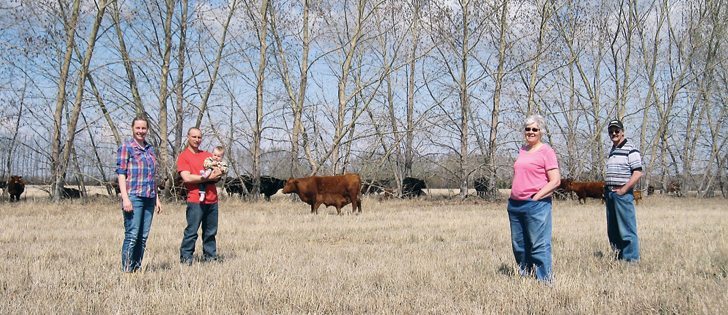Farming sustainably | Holistic management central to goals of non-profit group
Farmland Legacies will deliver its first hamburgers to Saskatchewan food banks this fall, served up with a lesson in sustainable farming.
The non-profit organization operates a seven quarter section organic farm near Wynyard, Sask., called the Home Quarter, donated by the Gillis family.
Duane Guina, program manager, said the farm will provide food for the hungry from a farm based in holistic management.
“We were looking for a way as a charity to bring this full circle and do good directly in the community,” he said.
Read Also

Know what costs are involved in keeping crops in the bin
When you’re looking at full bins and rising calf prices, the human reflex is to hold on and hope for more. That’s not a plan. It’s a bet. Storage has a price tag.
“The concept was to grow food, increase the nutritional value of hampers at Saskatchewan food banks.”
Bill Hall, executive director of Food Banks of Saskatchewan, welcomes the contributions, saying it offers a more permanent supply.
“The meat is something we’re always lacking,” he said, noting most donations include non-perishables like pasta and rice.
Individuals and community gardens also donate produce during the growing season.
His group represents 27 food banks, which assist 25,000 clients a month.
Hall said food banks built up their capacity, including access to a refrigerated vehicle and freezers, when they acquired donations of pork after government programs were implemented to help producers downsize their herds.
Farmland Legacies hopes to establish similar farm operations in Alberta and Manitoba and add vegetables and fruit in the future.
Guina said the organization acquires land in trust through donations or bequests, operating on revenue garnered from this land. It in turn leases the land to farmers interested in sustainable farming methods.
It plans to raise funds through its Wall of Fame campaign to compile and commemorate legal descriptions of home quarters and has re-ceived a $9,000 annual donation from the Saskatchewan Union of Nurses.
Tracy Zambory, SUN president, said better diets mean better health and brighter futures for families.
“This is part of a front end strategy instead of always picking up at the back end. It’s win-win for everybody,” she said.
The Wynyard farm has been in operation since 2008, keeping animals from a 2011 calf crop and slowly building its herd to the current 60 head.
Farm managers Pamela and Nick Wolanski, who live on site with their infant, Marli, bring their training in holistic management to the operation.
They receive help from volunteers and trade services with a local man, who does their haying.
Nick said the herd is grass fed and finished and bale grazed through the winter.
He said the cattle are kept in the fields as opposed to corrals so they can distribute manure back onto the land and reduce labour in cleaning corrals.
Nick said the land, which was seeded to grasses and legumes, has been chemical free for more than 40 years.
“It’s a neat thing to be able to enjoy all the hard work put into this land,” he said, citing pear trees that still produce.
“That forethought doesn’t happen overnight and that’s the same with (Farmland Legacies). We’re slowly trying to work toward something that is a positive step forward.”
Board member Marian Noll, an advocate for farming chemical free, volunteers her labour.
“We don’t have to put what might poison something else into the earth in order for the earth to provide for us,” she said.
Pamela, who grew up on an organic farm near Moose Jaw, Sask., calls this farm a natural fit for her.
“We believe in sustainable agriculture and growing local food and we support small family farms,” she said.
“Because of the hard work and holistic thinking of Farmland Legacies and the generosity of (the Gillis family), it’s given Nick and I the opportunity to farm and raise children and have a positive work experience,” she said.
Guina said the farm is an opportunity for young people to get into farming and overcome barriers of high land costs.
“We need to bring some of these issues to the forefront and challenge people’s thinking so when they go to the grocery store, they’re voting with the way they spend their money and supporting local and hopefully making it more attractive and affordable for people to make a living farming,” he said.
“Net income from farming continues to fall and level off, while off-farm income that supports agriculture continues to grow, and I think there’s something wrong with that picture.”
Guina said 40 percent of Canada’s arable land is in Saskatchewan, which imports most of its food from other countries.
“We need to take more personal responsibility for our own health and what we put into our bodies and how far food travels.”
Guina said the Home Quarter will eventually add housing for visitors, volunteers and young campers to learn about more natural farm practices.















